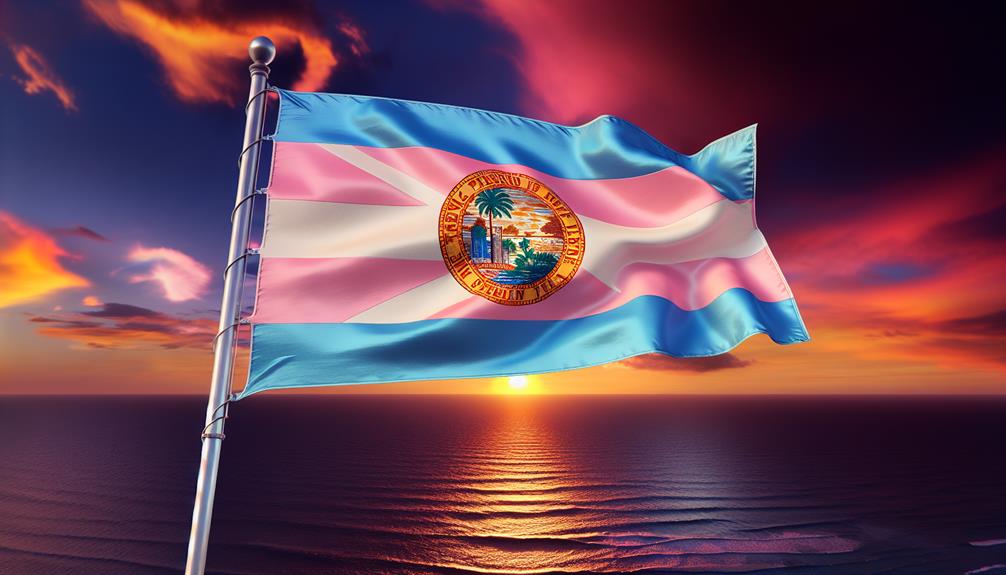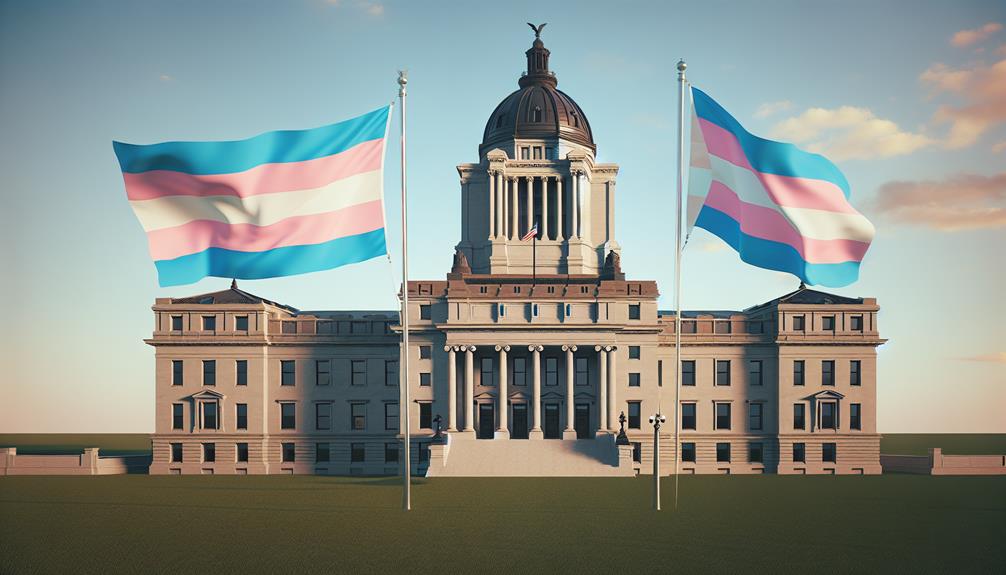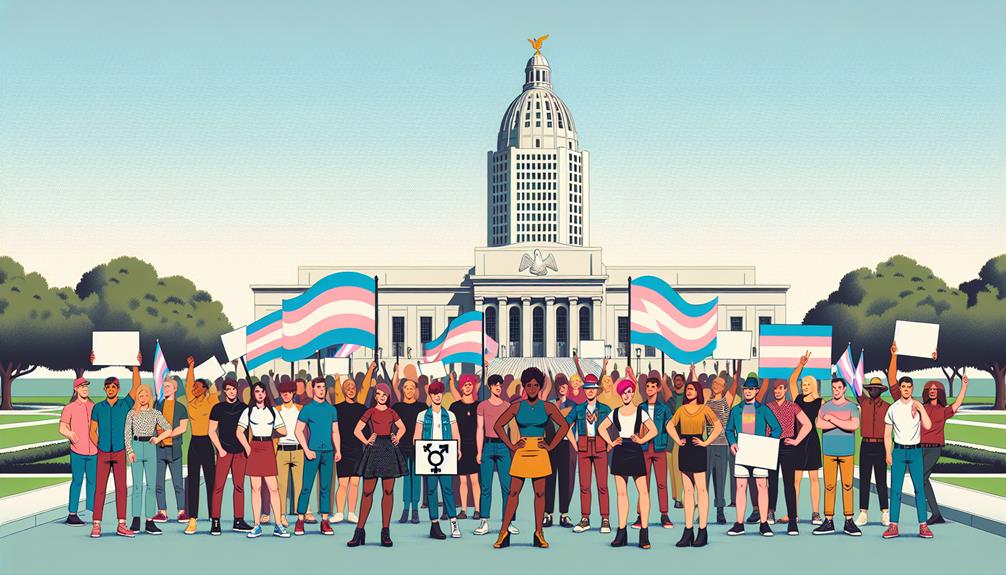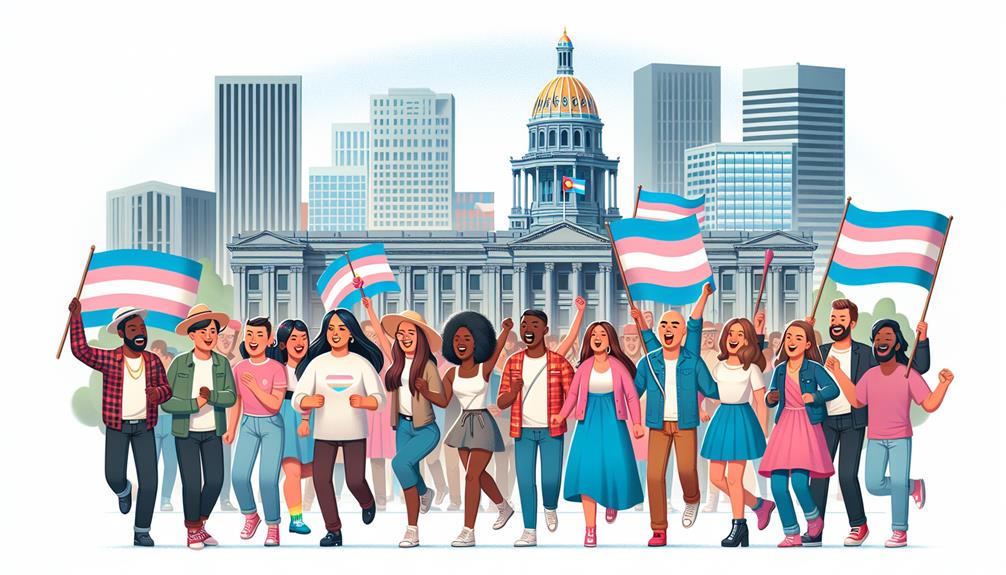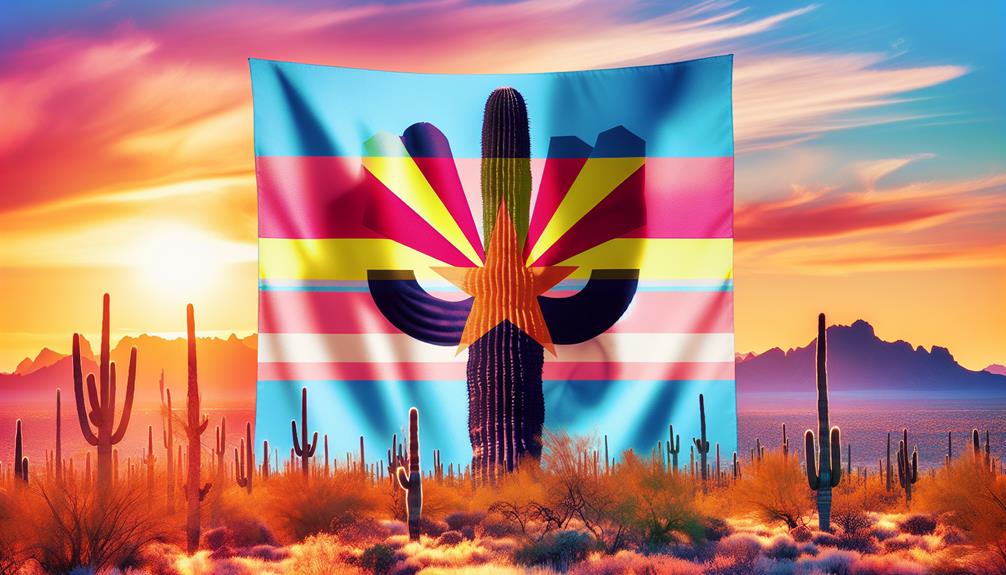
Discover the latest on transgender rights and issues in Arizona. Stay informed and engaged with the evolving state of affairs.
Table of Contents
ToggleArizona Transgender State of Affairs
The recent passing of anti-LGBTQ+ bills in Arizona has significantly impacted the transgender community in the state. These bills, which restrict access to gender-affirming healthcare for minors and ban transgender athletes from competing on women’s and girls’ sports teams, have sparked intense debate and raised concerns about the rights and well-being of transgender individuals.
The implications of these legislative changes have reverberated beyond the political sphere, affecting various aspects of daily life for transgender Arizonans. However, the full extent of these impacts and the ongoing efforts to address them present a complex and evolving landscape that warrants closer examination.
Key Takeaways
- Arizona has passed anti-LGBTQ+ bills that restrict access to gender-affirming healthcare for minors and ban transgender athletes from competing on women’s and girls’ sports teams.
- The legislation has raised concerns about discrimination and marginalization of transgender youth.
- Access to gender-affirming healthcare is significantly restricted in Arizona, particularly for minors, which adds to the challenges faced by the transgender community.
- LGBTQ advocates, including organizations like the Human Rights Campaign and the ACLU, are actively opposing and challenging the discriminatory legislation through legal action.
Legislative Landscape
Enacting laws that restrict access to gender-affirming health care for minors and prohibit transgender athletes from competing on women’s and girls’ sports teams, Arizona’s legislative landscape reflects a trend seen in several other Republican-controlled states. The state’s recent legislation has sparked widespread debate and controversy.
The bills significantly impact transgender youth in schools, addressing both their access to health care and participation in sports.
The legislation restricting gender-affirming health care for minors includes a ban on irreversible gender reassignment surgeries for individuals under 18, with limited exceptions. In addition, the law prohibits transgender athletes from competing on women’s and girls’ sports teams, aligning with similar measures in other Republican-controlled states.
This legislative landscape has drawn strong opposition from LGBTQ advocates, who argue that these measures are discriminatory and potentially harmful to transgender youth. They’ve expressed plans to challenge the health care ban in court.
The debate over transgender inclusion in sports has become a political flashpoint, with supporters of the bans advocating for fair competition while critics raise concerns about discrimination and the lack of consistent research suggesting transgender people have an athletic advantage.
Social Challenges
The social challenges faced by transgender youth in Arizona reflect a contentious and polarizing landscape shaped by legislative decisions. These challenges encompass various aspects of their lives, including school, athletics, and healthcare. Here are some specific social challenges:
- Legislation Impacting Schools: The passage of bills preventing teachers from respecting the pronouns of trans or non-binary students without written parental permission has caused widespread criticism from LGBTQ advocates.
- Transgender Athletes’ Rights: The ban on transgender athletes competing in women’s and girls’ sports teams in Arizona has sparked a debate, with supporters arguing for fair competition and critics highlighting the lack of consistent research suggesting transgender people have an athletic advantage.
- Healthcare Restrictions: LGBTQ advocates are vowing to challenge the health care ban in court, with the American Civil Liberties Union (ACLU) planning to fight against the violation of rights.
- Discrimination and Marginalization: Arizona’s bills targeting transgender youth have raised concerns among LGBTQ advocates who argue that these legislative decisions could potentially harm and marginalize transgender youth.
These social challenges reflect the complex and multifaceted issues faced by transgender youth in Arizona, highlighting the need for informed and inclusive societal discussions and policies.
Healthcare Access
Access to essential healthcare for transgender individuals in Arizona is significantly restricted due to legislative measures, particularly the ban on irreversible gender reassignment surgery for minors, except for intersex individuals. This law prevents transgender and gender-affirming care for trans youth, excluding them from accessing crucial medical interventions.
The state’s decision to limit healthcare access for transgender youth has drawn strong opposition from LGBTQ advocates, who are planning to challenge the ban in court. The American Civil Liberties Union (ACLU) is gearing up to fight against the violation of rights.
This restriction adds to the challenges faced by the transgender community in Arizona, with the broader national movement also posing legal hurdles. Despite the opposition, Arizona’s ban on irreversible gender reassignment surgeries for minors remains in place, further exacerbating the difficulties for transgender individuals in accessing essential healthcare.
These measures contribute to the ongoing debate surrounding the rights and healthcare access for transgender individuals, highlighting the need for inclusive and equitable healthcare policies.
Advocacy Efforts
LGBTQ advocates in Arizona are vehemently opposing bills targeting transgender youth, including restrictions on gender-affirming health care and participation in sports teams.
The Human Rights Campaign and Arizona State Director Bridget are at the forefront of advocacy efforts to protect the rights of transgender people in the state. To challenge the discriminatory legislation, advocates are working closely with organizations such as the American Civil Liberties Union (ACLU).
The focus of advocacy extends beyond sports bans to encompass other concerning bills, such as curriculum censorship bills, bathroom ban bills, and birth certificate legislation. The goal is to ensure that transgender individuals have access to gender-affirming health care and aren’t marginalized by restrictive policies that violate their rights.
Advocates are also striving to educate the public and policymakers about the importance of inclusivity and the harmful impact of such legislation on the transgender community. The efforts to combat these discriminatory measures reflect a commitment to upholding the rights and dignity of all individuals, regardless of their gender identity.
Future Outlook
Amid the passage of restrictive legislation, the future outlook for transgender individuals in Arizona is increasingly uncertain. The state has seen a wave of discriminatory bills, including those targeting transgender rights in school sports and proposing bathroom bans.
The Arizona State Director for a prominent civil rights organization expressed concerns about the impact of these laws on transgender individuals’ well-being and access to essential resources. The debate over transgender inclusion in sports is likely to continue, with potential legal challenges and advocacy efforts on the horizon. Similar legislation in other states has sparked ongoing discussions and legal battles, indicating a broader trend that could lead to continued legislative debates in Arizona.
The mental health of transgender youth is a significant concern, prompting the need for ongoing efforts to support and protect the rights of the LGBTQ+ community. Despite the uncertain landscape, organizations like the American Civil Liberties Union (ACLU) have vowed to fight against the violation of rights through legal action, offering hope for potential legal recourse and advocacy in the face of these challenges.
Frequently Asked Questions
Are There Any Specific Laws or Regulations in Arizona That Provide Protections for Transgender Individuals in the Workplace?
In Arizona, specific laws or regulations providing protections for transgender individuals in the workplace include anti-discrimination laws that prohibit employment discrimination based on gender identity.
These laws aim to ensure that transgender individuals are treated fairly and equitably in the workplace, including in hiring, promotion, and termination processes.
Employers are expected to comply with these regulations to create an inclusive and supportive work environment for all employees.
How Do Transgender Individuals in Arizona Experience Discrimination and Harassment in Their Daily Lives?
Transgender individuals in Arizona often face discrimination and harassment in their daily lives. This can manifest in various forms, including employment discrimination, denial of services, and verbal or physical abuse.
These experiences can have significant negative impacts on their mental health and well-being. Despite efforts to improve awareness and understanding, there’s still a need for greater legal protections and societal acceptance to ensure the safety and equal treatment of transgender individuals.
What Are the Specific Barriers That Transgender Individuals Face When Trying to Access Gender-Affirming Healthcare in Arizona?
Transgender individuals in Arizona face specific barriers when trying to access gender-affirming healthcare. These challenges include lack of insurance coverage, limited access to knowledgeable providers, and discriminatory policies.
These barriers can result in delays or denials of necessary medical care, which in turn can lead to negative health outcomes. Furthermore, social stigma and discrimination within healthcare settings can create additional obstacles to accessing quality, affirming care.
These challenges highlight the urgent need for inclusive and accessible healthcare services for transgender individuals.
What Organizations or Groups Are Actively Advocating for the Rights of Transgender Individuals in Arizona and What Specific Initiatives Are They Working On?
Several organizations and groups in Arizona are actively advocating for the rights of transgender individuals. They’re working on initiatives such as legal advocacy, policy change, and providing support and resources for the transgender community.
These organizations aim to address issues like discrimination, healthcare access, and public awareness. Their efforts are crucial in advancing the rights and well-being of transgender individuals in the state.
What Are the Potential Changes or Advancements That Could Improve the State of Affairs for Transgender Individuals in Arizona in the Coming Years?
Potential changes for transgender individuals in Arizona could include:
- Improved access to healthcare
- Increased anti-discrimination protections
- Enhanced support services
Advancements in education and awareness programs could foster:
- Greater understanding
- Acceptance
Advocacy for inclusive policies in areas like employment and housing may also positively impact the community.
Collaborative efforts between government, organizations, and the public can contribute to:
- Creating a more inclusive and supportive environment for transgender individuals in the coming years.
Final Thoughts
In conclusion, the state of affairs for transgender individuals in Arizona is troubling due to the recent passing of anti-LGBTQ+ bills. These measures restrict access to gender-affirming healthcare for minors and ban transgender athletes from competing on women’s sports teams.
In Arizona, 78% of transgender students have reported experiencing discriminatory policies at school. This statistic highlights the challenges faced by transgender youth in the state and the urgent need for advocacy and support.
Profile Author / Editor / Publisher
- Dora Saparow
- Dora Kay Saparow came out in a conservative Nebraskan town where she faced both misunderstanding and acceptance during her transition. Seeking specialized support, she moved to a big city, where she could access the medical, legal, and social resources necessary for her journey. Now, twelve years later, Dora is fully transitioned, happily married, and well-integrated into society. Her story underscores the importance of time, resources, and community support, offering hope and encouragement to others pursuing their authentic selves.
Latest entries
 News and AdvocacyNovember 14, 2025Rainbow Victories: 2025’s Most Pro-LGBTQ+ States Revealed
News and AdvocacyNovember 14, 2025Rainbow Victories: 2025’s Most Pro-LGBTQ+ States Revealed News and AdvocacyNovember 14, 2025Transgender Sanctuary States: Protecting Rights, Providing Hope
News and AdvocacyNovember 14, 2025Transgender Sanctuary States: Protecting Rights, Providing Hope Featured PostsNovember 13, 2025When Restroom Policing Backfires: The Hotel That Went Too Far
Featured PostsNovember 13, 2025When Restroom Policing Backfires: The Hotel That Went Too Far Featured PostsNovember 13, 2025Sex, Safety, and Seduction: A Trans Girl’s Guide to Hookups
Featured PostsNovember 13, 2025Sex, Safety, and Seduction: A Trans Girl’s Guide to Hookups

